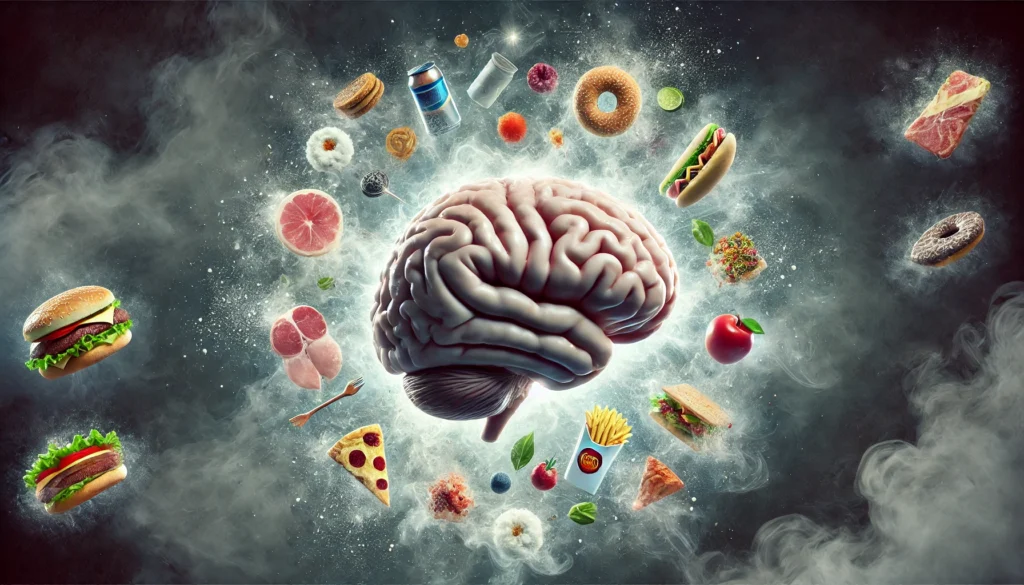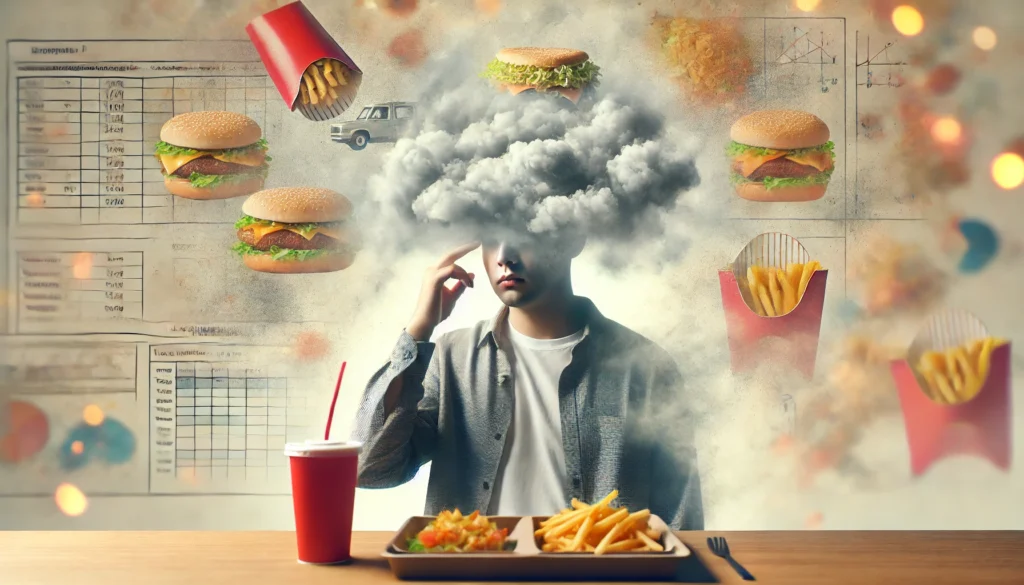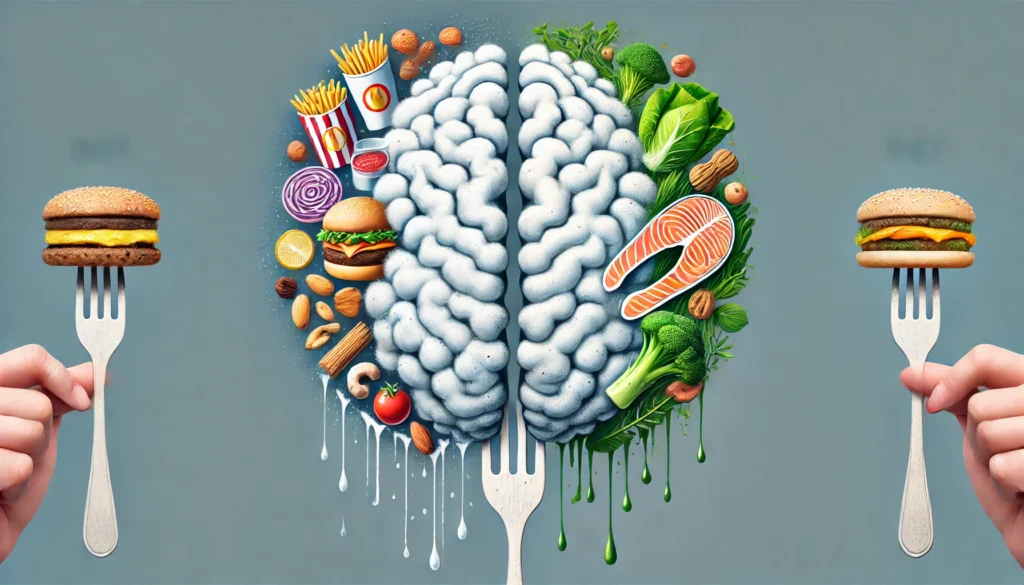Introduction
Experiencing brain fog after eating is a common yet often misunderstood phenomenon. Many individuals report feeling sluggish, mentally unclear, or even disoriented after consuming certain meals. This condition can significantly impact daily activities, work performance, and overall quality of life. Understanding the connection between diet and cognitive function is essential for those seeking mental clarity and sustained energy throughout the day.
You may also like: What Vitamin Deficiency Causes Brain Fog? Key Nutrients You Might Be Missing
Brain fog refers to a set of cognitive symptoms, including difficulty concentrating, forgetfulness, and mental fatigue. While many factors can contribute to brain fog, diet plays a crucial role in either alleviating or exacerbating these symptoms. The link between food and brain function is well-established in scientific literature, highlighting the importance of nutrition in maintaining optimal mental performance. This article explores the underlying causes of brain fog after eating, identifies dietary triggers, and offers practical strategies to enhance cognitive clarity through mindful nutrition.

The Science Behind Brain Fog and Diet
The brain is an energy-intensive organ that requires a steady supply of nutrients to function optimally. Blood sugar levels, nutrient composition, and inflammatory responses all influence cognitive performance. After eating, the body undergoes a complex metabolic process that affects brain function in various ways. The type of food consumed, individual metabolic responses, and underlying health conditions determine whether a meal enhances or diminishes mental clarity.
Certain foods can lead to rapid fluctuations in blood glucose levels, triggering temporary cognitive impairment. Processed carbohydrates, sugary foods, and high-fat meals can cause insulin spikes, leading to a subsequent drop in blood sugar levels, resulting in brain fog. Additionally, inflammatory foods can exacerbate symptoms by increasing oxidative stress and promoting neuroinflammation. Understanding these mechanisms is crucial for identifying dietary patterns that support sustained mental clarity.
Blood Sugar Fluctuations and Cognitive Function
One of the primary reasons why the brain feels hazy after eating food is the impact of blood sugar fluctuations. The body regulates blood glucose levels through insulin secretion, ensuring a steady energy supply for the brain and other organs. However, consuming high-glycemic foods can disrupt this balance, leading to cognitive impairment.
Refined carbohydrates, such as white bread, pastries, and sugary beverages, are rapidly digested and absorbed, causing a sharp rise in blood glucose levels. This triggers an excessive release of insulin, leading to a subsequent drop in blood sugar levels. As glucose levels decline, the brain experiences an energy deficit, manifesting as brain fog, fatigue, and difficulty concentrating.
To maintain stable blood sugar levels and prevent cognitive fluctuations, it is essential to consume balanced meals with a combination of complex carbohydrates, proteins, and healthy fats. Whole grains, legumes, lean proteins, and fiber-rich vegetables provide a sustained release of glucose, supporting optimal brain function throughout the day.
The Role of Inflammation in Brain Fog
Inflammation is a key contributor to cognitive impairment and is often exacerbated by poor dietary choices. Chronic inflammation can affect brain function by promoting oxidative stress, disrupting neurotransmitter balance, and impairing neurovascular function. Certain foods trigger inflammatory responses, leading to systemic inflammation that impacts cognitive performance.
Highly processed foods, trans fats, and artificial additives are known to increase inflammatory markers in the body. Additionally, food intolerances and sensitivities, such as gluten or dairy intolerance, can contribute to neuroinflammation, resulting in brain fog. Identifying and eliminating inflammatory foods from the diet can help improve mental clarity and cognitive function.
Anti-inflammatory foods, such as fatty fish, leafy greens, nuts, seeds, and berries, provide essential nutrients that support brain health. Omega-3 fatty acids, polyphenols, and antioxidants found in these foods help combat inflammation and promote optimal neurological function.
Food Sensitivities and Brain Fog
Food sensitivities and intolerances are common yet often overlooked contributors to post-meal brain fog. Unlike food allergies, which trigger an immediate immune response, food sensitivities cause delayed reactions that can affect cognitive function hours after consumption. Common culprits include gluten, dairy, soy, and artificial additives.
Individuals with gluten sensitivity or celiac disease may experience cognitive impairment after consuming wheat-based products. Similarly, dairy intolerance can lead to brain fog due to the inflammatory effects of casein and lactose. Conducting an elimination diet or food sensitivity testing can help identify specific triggers, allowing individuals to make informed dietary adjustments.
The Gut-Brain Connection
The gut microbiome plays a significant role in brain health and cognitive function. The gut and brain are interconnected through the gut-brain axis, a bidirectional communication system that influences mood, memory, and mental clarity. An imbalance in gut bacteria, known as dysbiosis, can lead to systemic inflammation, neurotransmitter imbalances, and cognitive impairment.
Consuming a diet rich in probiotic and prebiotic foods supports gut health and enhances brain function. Fermented foods, such as yogurt, kefir, sauerkraut, and kimchi, introduce beneficial bacteria that promote a healthy microbiome. Prebiotic fibers found in garlic, onions, bananas, and asparagus provide nourishment for gut bacteria, further supporting cognitive well-being.
Hydration and Cognitive Performance
Dehydration is a common yet frequently underestimated cause of brain fog. The brain is composed of approximately 75% water, and even mild dehydration can impair cognitive performance, leading to difficulty concentrating, memory lapses, and mental fatigue. Many individuals do not consume adequate fluids throughout the day, exacerbating symptoms of brain fog.
Drinking sufficient water, herbal teas, and electrolyte-rich beverages can help maintain optimal hydration levels. Avoiding excessive caffeine and alcohol consumption is also crucial, as these substances can contribute to dehydration and impair cognitive function. Implementing a consistent hydration routine supports overall brain health and enhances mental clarity.
Practical Strategies to Prevent Brain Fog After Eating
Addressing dietary factors that contribute to brain fog requires a multifaceted approach. Implementing the following strategies can help optimize cognitive function and prevent post-meal mental fatigue:
- Choose Nutrient-Dense Foods: Prioritize whole, unprocessed foods that provide essential vitamins, minerals, and antioxidants. Focus on lean proteins, healthy fats, fiber-rich vegetables, and complex carbohydrates to maintain stable energy levels.
- Monitor Blood Sugar Levels: Avoid high-glycemic foods and opt for slow-digesting carbohydrates that promote sustained glucose release. Pairing carbohydrates with protein and healthy fats can help prevent insulin spikes and crashes.
- Identify and Eliminate Food Sensitivities: Pay attention to how certain foods affect cognitive function and consider eliminating potential triggers. Keeping a food diary can help track patterns and identify problematic ingredients.
- Support Gut Health: Incorporate probiotic and prebiotic foods to maintain a healthy gut microbiome. A balanced gut environment supports neurotransmitter production and reduces inflammation.
- Stay Hydrated: Ensure adequate fluid intake throughout the day, aiming for at least eight glasses of water. Herbal teas and electrolyte-rich beverages can further support hydration and cognitive function.
- Practice Mindful Eating: Eating in a relaxed environment, chewing food thoroughly, and avoiding distractions can enhance digestion and prevent post-meal sluggishness.

Frequently Asked Questions (FAQ) About Brain Fog After Eating
1. Why do I get brain fog after eating certain foods?
Many people experience brain fog after eating, often due to food sensitivities, blood sugar fluctuations, or inflammatory responses triggered by certain ingredients. Processed foods high in refined sugars and unhealthy fats can lead to sharp spikes and crashes in blood glucose levels, making the brain feel hazy after eating food. Additionally, undiagnosed food intolerances, such as gluten or dairy sensitivity, can cause low-grade inflammation that contributes to brain fog and diet-related sluggishness. Nutrient deficiencies, especially in B vitamins, magnesium, and omega-3 fatty acids, may also play a role. Keeping a food journal and identifying trigger foods can help manage these symptoms effectively.
2. Can dehydration contribute to brain fog after eating?
Yes, dehydration can significantly impact cognitive function, and when combined with certain meals, it can worsen brain fog after eating. Water plays a critical role in transporting nutrients to the brain and flushing out toxins, so even mild dehydration can impair mental clarity. If you often find that your brain feels hazy after eating food, consider whether you’re drinking enough fluids throughout the day. Inadequate hydration can also slow digestion, leading to bloating and sluggishness, which further contribute to brain fog and diet-related fatigue. Drinking a glass of water before meals and opting for hydrating foods like fruits and vegetables may help improve mental clarity.
3. How does gut health influence brain fog after eating?
The gut and brain are closely linked through the gut-brain axis, meaning that digestive health directly affects cognitive function. Poor gut health, caused by imbalanced gut bacteria or leaky gut syndrome, can contribute to brain fog and diet-related cognitive sluggishness. When harmful bacteria outnumber beneficial ones, they produce toxins that can enter the bloodstream and affect brain function. Additionally, if your gut lining is compromised, undigested food particles and inflammatory compounds may trigger immune responses that make your brain feel hazy after eating food. Incorporating probiotic-rich foods like yogurt, kefir, and fermented vegetables may help restore gut balance and reduce brain fog after meals.
4. Are food additives responsible for brain fog after eating?
Yes, artificial additives, preservatives, and flavor enhancers in processed foods can contribute to brain fog after eating. Many of these chemicals, such as monosodium glutamate (MSG) and artificial sweeteners, may interfere with neurotransmitter function and cause the brain to feel hazy after eating food. Some individuals are more sensitive to these additives and may experience headaches, fatigue, and mental sluggishness as a result. Reading ingredient labels and opting for whole, unprocessed foods can help reduce exposure to these potential triggers. If you suspect food additives are affecting your cognitive clarity, consider an elimination diet to identify specific culprits.
5. How do blood sugar levels affect brain fog and diet choices?
Fluctuating blood sugar levels are a common cause of brain fog after eating, particularly when consuming high-glycemic foods. Simple carbohydrates, like white bread, sugary snacks, and pasta, can cause rapid blood sugar spikes followed by crashes, leading to fatigue and mental fog. When blood sugar drops too quickly, the brain struggles to function optimally, making it feel hazy after eating food. Balancing meals with protein, healthy fats, and fiber can help stabilize blood sugar and prevent sudden cognitive dips. Choosing complex carbohydrates like quinoa, sweet potatoes, and whole grains can also support steady energy levels throughout the day.
6. Can eating too fast contribute to brain fog after meals?
Yes, eating too quickly can overload the digestive system and contribute to brain fog after eating. When you eat rapidly, your body struggles to properly digest food, leading to bloating, sluggish digestion, and a lack of proper nutrient absorption. Additionally, eating too fast can cause insulin spikes, making your brain feel hazy after eating food. Mindful eating techniques, such as chewing thoroughly and savoring each bite, can improve digestion and reduce post-meal brain fog. Slowing down during meals also helps your body recognize satiety cues, preventing overeating and its associated sluggishness.
7. Does intermittent fasting help with brain fog after eating?
For some individuals, intermittent fasting can help regulate blood sugar levels and improve cognitive clarity, potentially reducing brain fog after eating. By giving the digestive system extended rest periods, intermittent fasting allows the body to regulate insulin production and reduce inflammation. If your brain feels hazy after eating food, fasting may help reset metabolism and improve gut health. However, it’s important to ensure that when you do eat, your meals are nutrient-dense and balanced to avoid further contributing to brain fog and diet-related fatigue. Consulting with a healthcare professional before starting intermittent fasting is advisable, especially for individuals with blood sugar concerns.
8. Could allergies be the reason I experience brain fog after eating?
Yes, undiagnosed food allergies and sensitivities can be a major cause of brain fog after eating. Many common allergens, such as gluten, dairy, soy, and nuts, can trigger immune responses that lead to inflammation and cognitive sluggishness. If your brain feels hazy after eating food, it may be helpful to undergo allergy testing or try an elimination diet. Even mild sensitivities can contribute to brain fog and diet-related cognitive issues over time. Identifying and eliminating problematic foods from your diet can significantly improve mental clarity and overall well-being.
9. How do nutrient deficiencies contribute to brain fog after eating?
Deficiencies in key nutrients, such as B vitamins, iron, magnesium, and omega-3 fatty acids, can contribute to brain fog after eating. These nutrients are essential for neurotransmitter function, energy production, and overall brain health. If your brain feels hazy after eating food, consider whether your diet provides enough of these essential nutrients. For example, vitamin B12 plays a crucial role in cognitive function, and low levels can lead to sluggishness and forgetfulness. Incorporating nutrient-dense foods like leafy greens, fatty fish, nuts, and seeds can help support mental clarity and reduce post-meal brain fog.
10. Can poor sleep quality make brain fog worse after meals?
Yes, inadequate or poor-quality sleep can amplify the effects of brain fog after eating. When you’re sleep-deprived, your brain struggles to efficiently process glucose, leading to slower cognitive function and an increased likelihood of experiencing post-meal sluggishness. If your brain feels hazy after eating food, improving your sleep hygiene—such as maintaining a consistent sleep schedule, limiting screen time before bed, and optimizing your sleep environment—may help. Poor sleep can also increase cravings for processed and sugary foods, which further contribute to brain fog and diet-related cognitive issues. Prioritizing restful sleep can enhance mental clarity and overall well-being throughout the day.

Conclusion
Brain fog after eating is a multifaceted issue influenced by blood sugar fluctuations, inflammation, food sensitivities, gut health, and hydration levels. Understanding the relationship between diet and cognitive function empowers individuals to make informed dietary choices that enhance mental clarity and overall well-being. By prioritizing nutrient-dense foods, stabilizing blood sugar levels, reducing inflammation, and maintaining hydration, individuals can effectively prevent brain fog and optimize cognitive performance. A mindful approach to eating, combined with strategic dietary adjustments, can transform daily energy levels and support long-term brain health.
mental clarity after meals, cognitive function and diet, food-related brain fog, post-meal fatigue causes, diet and mental performance, gut health and cognition, blood sugar and brain function, inflammation and cognitive clarity, hydration and brain health, neurotransmitters and nutrition, healthy eating for focus, foods that affect concentration, digestive health and mental clarity, energy levels after eating, avoiding sluggishness after meals, balanced diet for brain health, probiotics and cognitive function, meal planning for sustained energy, dietary habits for mental sharpness, optimizing nutrition for focus
Further Reading:
Nutritional psychiatry: Your brain on food
6 Possible Causes of Brain Fog
How Your Diet Influences Brain Fog
Important Note: The information contained in this article is for general informational purposes only, and should not be construed as health or medical advice, nor is it intended to diagnose, prevent, treat, or cure any disease or health condition. Before embarking on any diet, fitness regimen, or program of nutritional supplementation, it is advisable to consult your healthcare professional in order to determine its safety and probable efficacy in terms of your individual state of health.Regarding Nutritional Supplements Or Other Non-Prescription Health Products: If any nutritional supplements or other non-prescription health products are mentioned in the foregoing article, any claims or statements made about them have not been evaluated by the U.S. Food and Drug Administration, and such nutritional supplements or other health products are not intended to diagnose, treat, cure, or prevent any disease.


